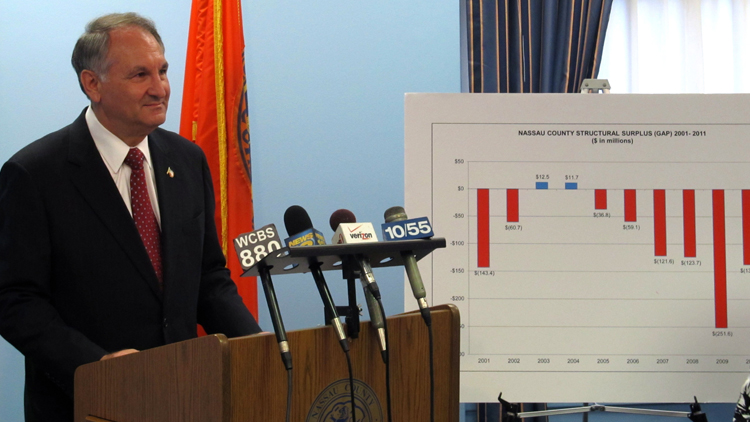
Nassau County could be facing almost a $77 million budget shortfall this year unless immediate steps are taken, warns County Comptroller George Maragos.
Maragos, a Republican, issued the warning in his 2014 mid-year financial projection, which predicts that the county’s operating funds could end with a $76.9 million deficit due to a sharp decline in sales tax revenues, lower state and federal aid and unforeseen spending for police overtime.
His dire forecast comes weeks before Nassau County Executive Ed Mangano, also a Republican, has to release his 2015 budget on Sept. 15. The Nassau Interim Finance Authority (NIFA), the county’s financial control board, will have the last word on approving the final budget because it took over Nassau’s finances under state law in 2011.
“The projected deficit is primarily the result of an estimated $90 million shortfall in sales tax revenues from lower economic activity after the prior year’s surge from Superstorm Sandy recovery spending, and a shift to online shopping,” said Maragos in a statement. “The Administration, NIFA, and the Legislature must find areas to reduce expenses immediately in order to end the year in balance.”
According to Maragos, the structural budget gap, which is the difference between recurring revenues and recurring expenses, would “widen to $242 million, from $99.1 million in 2013” and would be “a major reversal in the year-over-year fiscal improvements achieved since 2009.”
“Immediate steps are required by the administration and NIFA to cut costs and reduce borrowing so that the county ends close to budget and the other fundamental fiscal trends are not reversed but continue to improve,” warned Maragos. “Swift actions will avoid the unpleasant consequences that will arise from our projections, should they be allowed to materialize.”
Adding to the deficit, Maragos explained, is an estimated $90 million shortfall in sales tax revenue. The Mangano administration, however, is estimating a $51 million shortfall, according to Tim Sullivan, the deputy county executive for finance.
“The administration is concerned about the recent decline in sales tax revenue, and has retained an independent economic consultant to review the data,” said Sullivan in a statement to the Press. “To keep the budget balanced, a plan was developed to reduce [police] overtime spending through management initiatives and cut funds allocated for supplies, equipment and contractual expenses. The plan has been submitted to NIFA for review.”
“This situation is unfortunate, but not surprising,” said NIFA member Chris Wright, who had opposed NIFA’s recent approval of the county’s lifting the three-year wage freeze on four of the five public unions because he thought there weren’t provisions in place to offset the raises with new revenue or appropriate cost cutting.
“It’s exactly what was to be expected—and was predicted by objective analysts—when the county added substantially to its cost base in the face of declining revenues. That the county did so with NIFA’s approval compounded the error,” Wright continued.
“Double and triple counting amounts from other efforts isn’t a plan,” he added, “and borrowing for operating expenses is a bad plan, which is also completely contrary to NIFA guidelines passed unanimously last fall by the current board.”
Jon Kaiman, the former North Hempstead town supervisor whom Gov. Andrew Cuomo appointed to be NIFA chairman, had supported lifting the wage freeze with the hope that Nassau would come up with a plan to raise enough revenues to cover $130 million in new contract costs over the next four years.
Wright had warned that the new contracts would cost more than that.
“NIFA has the tools available to make a difference here, and has initiated a process by which we can,” said Wright. “What remains to be seen is whether we will.”
Meanwhile Nassau County remains more than $3 billion in debt, according to the comptroller’s office.
And that number looks like it’s only going to rise.
































